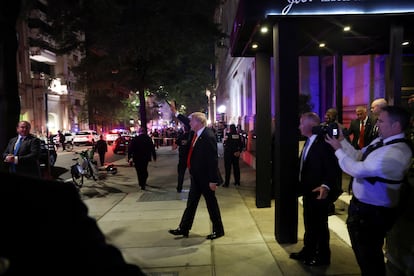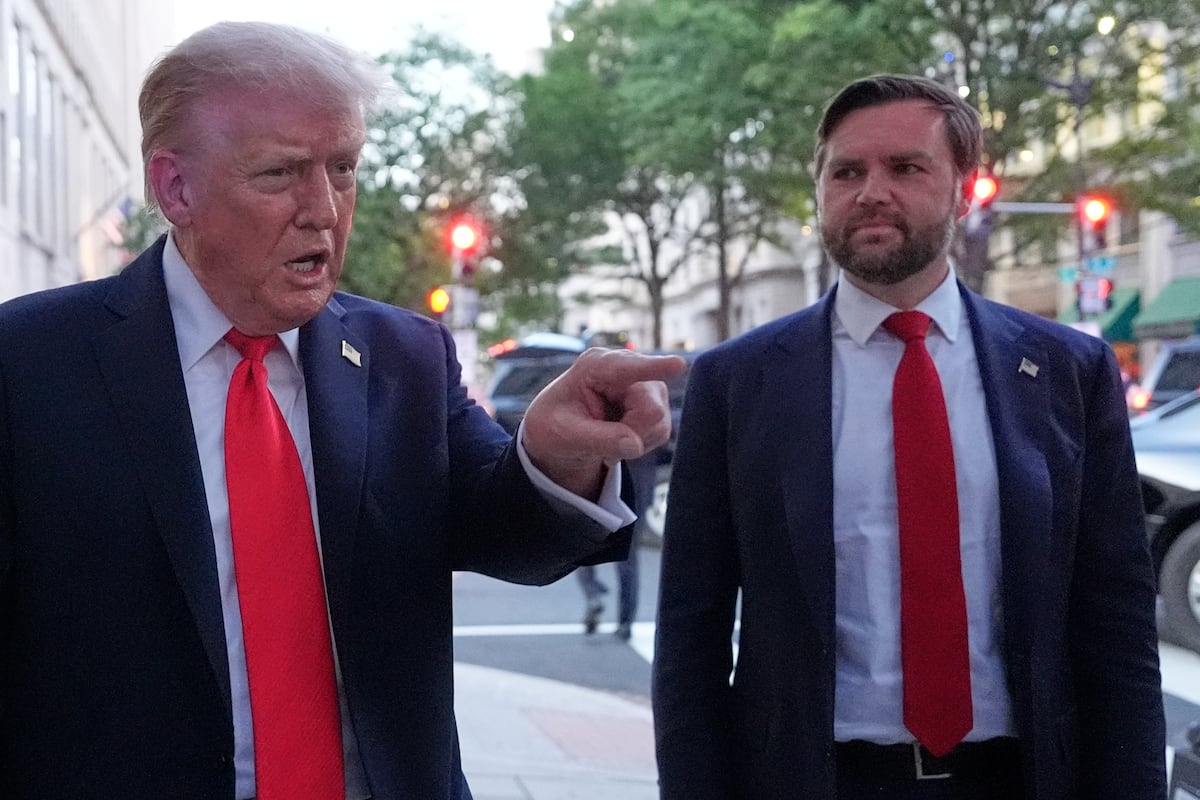Donald Trump went out to dinner Tuesday night in Washington. It was the first time he had done so since his return to the White House last January and one of the rare occasions he has gone out since eight years ago, when he first became president of the United States and often went to Trump Tower, the hotel he owned in the city and sold in 2022.
The occasion was special — at least for him. He wanted to promote the “success” of the deployment of the National Guard in the U.S. capital, a measure that, as of this Wednesday, marks one month, has few precedents, and was adopted to combat crime that statistics show is actually declining.
It was a brief outing. The chosen restaurant, a downtown classic with a menu focused on meat and seafood called Joe’s Seafood, Prime Steak & Stone Crab, is just two blocks from the White House, and the president of the United States made his way there. He was joined by the vice president, J. D. Vance, and some of the most prominent members of his cabinet, including the Defense Secretary Pete Hegseth and Secretary of State Marco Rubio.
At the restaurant entrance, some cheers could be heard. Trump said: “We’re standing right in the middle of D.C., which, as you know about over the last year was a very unsafe place — over the last 20 years. And now it’s got virtually no crime.” Then, seemingly speaking of his own experience, he added: “People are going out to dinner where they didn’t go out for years.”
Inside, however, a group of disgruntled residents who disagreed with that diagnosis awaited him. They greeted him with shouts of “Free Palestine!” “Free D.C.!” and called him “the Hitler of our time.” In a city that in the last elections gave 92% of its votes to Democratic candidate Kamala Harris, those protesters are not exactly isolated cases, as was evident last Saturday, when thousands of people took to the streets to protest what they see as a worrying authoritarian move by the Trump government.
 U.S. President Donald Trump waves as he leaves from the Joe’s Seafood restaurant near the White House after dinner, in Washington, D.C., U.S., September 9, 2025. Jonathan Ernst (REUTERS)
U.S. President Donald Trump waves as he leaves from the Joe’s Seafood restaurant near the White House after dinner, in Washington, D.C., U.S., September 9, 2025. Jonathan Ernst (REUTERS)
Trump considers the operation to be a complete success, despite the complaints. The data support him at least in terms of the drop in crime: according to figures from the Metropolitan Police, homicides are down 60%, car thefts 35%, robberies 19%, and violent crimes 10%. It is also true, however, that officers have displaced the homeless from downtown — simply pushing them across the river into neighboring Virginia — and that hundreds of undocumented migrants have been detained.
On Monday, the U.S. president lamented only that the cost of the operation — already high, given the expense of maintaining more than 2,000 troops, some brought in from other states, on the ground — was being spoiled by “much lesser things, things that take place in the home they call crime.” “They’ll do anything they can to find something,” he added. “If a man has a little fight with the wife, they say this was a crime.”
Beyond this apparent defense of domestic violence (a point the White House press secretary, Karoline Leavitt, stressed again on Tuesday), the deployment of the National Guard has also had an impact on tourism, which has declined. Restaurants have also seen reservations drop, despite Trump’s impression, according to estimates reported by CNN. And the city’s judicial system, already overstretched, is struggling to process the flood of new cases — especially those of undocumented migrants intercepted on the streets, in schools, churches, and workplaces.
Dimmed streets
The truth is that the city feels subdued. Playgrounds are half-empty because many nannies are undocumented and afraid to leave their homes. Fourteenth and U Streets, hubs of nightlife, no longer buzz as they once did (which, to be fair, was never that much). Uber drivers complain they have fewer rides than before. There has also been criticism that soldiers are stationed in areas such as the National Mall — home to major museums and a tourist hotspot — rather than in neighborhoods with the highest crime rates, such as Anacostia.
Among disgruntled residents, there is a sense of resignation. Initially, the National Guard deployment was decided for 30 days, but last week that deadline was extended until November 30, because military authorities believe “the mission is not complete.” Trump has the authority to shorten the period if he deems it necessary.
Until then, he can count on the support of the mayor, Democrat Muriel Bowser, who has faced criticism for her weak opposition to the White House’s moves compared with the more combative leaders of other targeted cities, such as Los Angeles — where some 5,000 troops were deployed last June to quell protests against immigration raids — and Chicago, which is preparing to be the next city taken over by Trump. Not only that: Bowser, apparently satisfied with the decline in crime in the capital, has issued a directive ordering local police to coordinate with federal agents indefinitely.
Meanwhile, Trump has been using the supposed success of the deployment in Washington to justify his plans to continue sending troops to other parts of the country. “Washington, D.C. IS A SAFE ZONE IN JUST A MATTER OF WEEKS. Thank you, President Trump,” he wrote in one of his peculiar messages (full of capital letters and written in the third person) on his social network, Truth Social. “Who’s Next?”
The names being floated include New Orleans, Baltimore, and Boston. The order is unclear, but what is clear is that this would mean an unprecedented military deployment on U.S. soil — forcing the Republican Party, and especially House Speaker Mike Johnson, into intellectual contortions as they celebrate one federal intervention after another in state and local affairs. To grasp what that contortion requires, it’s worth remembering this is a nation built on a slogan (“Don’t Tread on Me”) and the image of a rattlesnake ready to strike back at central authority.
Sign up for our weekly newsletter to get more English-language news coverage from EL PAÍS USA Edition
